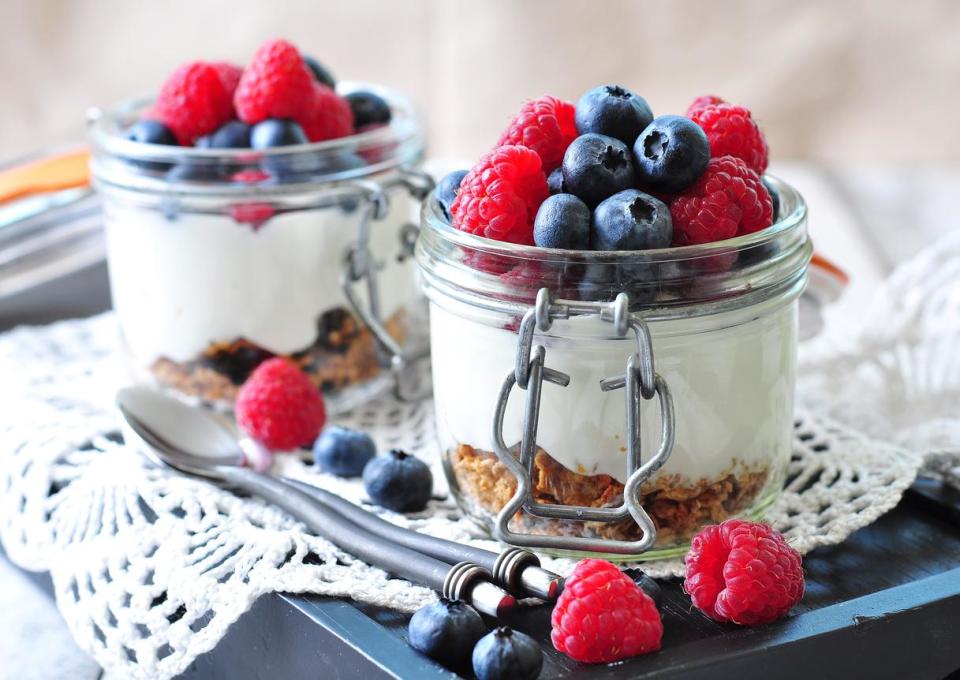Six secret rules of footballers’ diets

Professional footballers - like all elite athletes - need to pay as much attention to their diet as their training.
And whereas in the past, they might have come off pitch and scoffed a meal of steak and chips, there’s now a much greater focus on nutrition and its effect on a player’s game.
“Nutrition impacts everything from a player’s endurance levels and speed to their recovery to their sleep patterns,” sports scientist Armando Vinci, who worked alongside the Chelsea manager Antonio Conte for almost a decade, told The Times.
It’s crucial that footballers get the right nutrients in the right quantities at the right times to ensure they perform their best on the pitch.
And there are certain secrets to their diets that we can all take away, whether you’re running up and down a field for 90 minutes or smashing a HIIT workout in the gym.
1. Stop drinking sports drinks
Consuming a sports drink every time you work out may negate all the hard work you’ve put in, as they're often high in calories and sugar.
“You need to be exercising fairly hard for at least an hour to make them worthwhile, otherwise you are effectively giving yourself an unnecessary dose of sugar,” John Brewer, professor of applied sport science at St Mary’s University, Twickenham, said.
Whilst footballers still have isotonic sports drinks on match days to provide a carbohydrate boost, they’ve cut down how many they used to consume.
2. Eat beef jerky
It’s no secret that consuming protein is crucial for muscle recovery and supermarket shelves are brimming with snacks that claim to offer protein boosts on the go.
But there’s a new post-workout snack appearing on the scene that footballers have been eating for a long time: beef jerky. It’s predicted to become an alternative to protein bars, shakes and balls.
“Beef jerky is a high-quality protein snack that provides your body with essential amino acids needed to build, maintain and repair muscle,” says Nancy Rodriguez, professor of nutritional sciences at the University of Connecticut.
3. Limit nightshades
Many people find foods that are part of the nightshade family - including peppers, tomatoes, aubergines and potatoes - hard to digest.
And players are being asked to cut down on tomato sauces as a result: “They contain compounds that block the absorption of calcium by the body and I always advise players to cut down on the amount of times they consume tomato-based pasta sauces,” says Vinci.
It’s not just footballers either - American football player Tom Brady famously doesn’t eat nightshades as part of his strict diet.
4. Eat blueberries, cherries and pomegranate seeds
Not just a supposed superfood, blueberries - along with cherries and pomegranate seeds - are anti-inflammatory and thus help with recovery - they’re a big part of many footballers’ diets.
Blueberries in particular are a great choice before a match as they boost the immune system: “These antioxidants can neutralise the free radicals produced during metabolism and protect the body against the damaging effects of these free radicals,” says sports and exercise physiology consultant, Dr Stewart Laing.
Blueberries are a source of carbs so help fuel players before exercising and they don’t spike your insulin levels either.
5. Manage your carbs
Burning as many calories as they do, it’s no surprise that footballers need carbs. But they don’t “carb-load,” as many people think, and the timing is crucial.
Recent scientific research has found that it’s essential to modify your carb intake based on whether you’re working out or not.
Professional footballers need about 7g of carbohydrate per kilogram of body weight on match days to optimise glycogen resynthesis, but on recovery days this drops to 2g per kilogram of body weight.
6. Eat Greek yoghurt before bed
Not only is Greek yoghurt a great source of protein, probiotics and calcium, but it could also help your body recover while you sleep if you eat some half an hour before bed:
“The protein in yoghurt and other milk products is almost entirely casein, which digests slowly in the body and is ideal for rebuilding muscle following any intense training session, but particularly a gym workout using weights,” Vinci says.
It’s a trick that could be helpful for anyone who does weight-training or resistance work.

